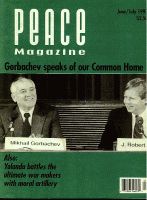
Peace Magazine Jun-Jul 1993, page 29. Some rights reserved.
Search for other articles by Elma Ondrey here
Rigoberta Menchu with Elisabeth Burgos-Debray, Verson 1992
I, Rigoberta Menchu, is a simply told, powerful story of a Guatemalan Indian woman's life and culture. She belongs to the Quiiche, one of the twenty-three indigenous ethnic groups who together make up the majority of the population in Guatemala.
When the military brutality is protested, they respond with more violence and Rigoberta watches her brother and other organizers burn to death. Instead of having the intended impact of striking terror in her and her people, seeing the tortured, burned bodies gives them the strength and courage to continue their resistance.
She learns that her father is imprisoned as a subversive and later burned to death with other organizers when they occupy the Spanish embassy. Then her mother is kidnapped, raped, tortured, left in the open to die and be eaten by animals. These horrendous experiences lead Rigoberta to question a morality that allows her people's existence to be threatened and at the same time states that it is a sin to kill human beings.
This is the turning point that leads her to accept the use of violence as a means of survival of her people.
Rigoberta's message is the story of her people and culture. It comes straight from the heart and is presented more like a series of conversations than a book. Because of this, at times the writing is rambling and redundant. It reminds me that craft, as well as content, is important in writing. I sense it could reach a greater audience if the content were better focused
The message is important because it so powerfully conveys, by showing us the impact on one individual, the effects of a political and economic system that exploits the poor.

Peace Magazine Jun-Jul 1993, page 29. Some rights reserved.
Search for other articles by Elma Ondrey here